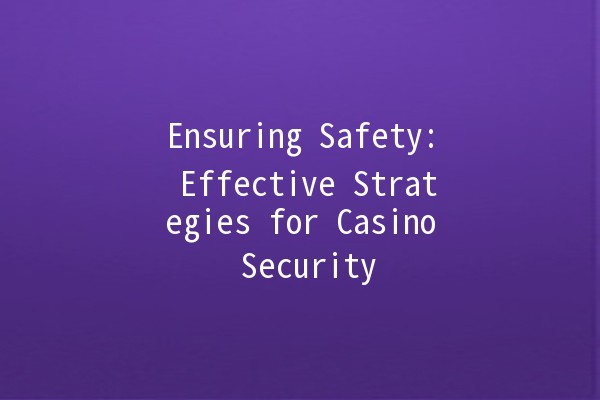The casino industry thrives on highstakes gaming, entertainment, and customer engagement. However, the very nature of this environment presents unique challenges in terms of security. This article explores key strategies to enhance casino security, providing insights on practical applications that can mitigate risks while ensuring a safe and enjoyable experience for guests.
Understanding Casino Security Challenges
Before delving into specific strategies, it is essential to recognize the primary challenges associated with casino security. Casinos face various threats, including theft, fraud, and violence. The combination of large cash holdings, valuable assets, and the presence of intoxicated patrons can exacerbate these vulnerabilities.
Key Strategies for Enhancing Casino Security

One of the cornerstones of effective casino security is a comprehensive surveillance system.
Explanation:
Installing highdefinition cameras throughout the gaming floor, entrances, and exits can significantly deter criminal activities. These systems can include facial recognition technology and realtime monitoring capabilities.
Practical Application:
For instance, a wellknown casino in Las Vegas recently upgraded its surveillance network to include AIdriven analysis. This technology enables security personnel to pinpoint suspicious behavior automatically, such as excessive table game losses or patrons wandering into restricted areas. By proactively addressing potential issues, casinos can prevent incidents before they escalate.
Security is not solely the responsibility of the surveillance team; all employees play a critical role in maintaining a safe environment.
Explanation:
Regular training programs should cover situational awareness, identification of suspicious behavior, and emergency response procedures.
Practical Application:
A successful casino implemented a quarterly training program for all staff members, including dealers and waitstaff. This initiative empowered employees to recognize potential security risks, such as underage gambling or signs of cheating, and provided clear protocols for reporting them. Consequently, the casino reported a 30% decrease in unauthorized activities within a year.
Limiting access to sensitive areas within the casino is vital in protecting both customers and assets.
Explanation:
Implementing strict access controls, including keycard systems for restricted areas and employee identification protocols, can significantly enhance security.
Practical Application:
In a recent renovation, a casino installed an RFID keycard system to control access to areas like the vault and highstakes gaming rooms. This system logs entry times and identities, which acts as a deterrent against unauthorized access. In addition, areas such as the cashhandling room are monitored 24/7 by security personnel and cameras, ensuring that only authorized staff are allowed entry.
Establishing a strong relationship with local law enforcement agencies is essential for an effective security strategy.
Explanation:
Local police can assist with training, threat assessments, and provide rapid response to emergencies.
Practical Application:
A casino in Atlantic City invited local law enforcement for regular briefings and joint training exercises. This collaboration ensured that officers were familiar with the property layout and protocols in case of emergencies. As a result, response times improved during incidents, ensuring that security measures were taken swiftly and effectively.
As technology evolves, casinos are increasingly reliant on digital platforms, making cybersecurity crucial.
Explanation:
Developing robust cybersecurity protocols can prevent unauthorized access to sensitive information and financial transactions.
Practical Application:
A casino that faced a series of cyberattacks invested in advanced encryption technologies and hired a dedicated cybersecurity team. Regular assessments and employee training on recognizing phishing attempts resulted in a significant decrease in successful cyber threats. They also created a dedicated reporting mechanism for any suspicious online activity, enhancing their overall security posture.
Common Security Questions in the Casino Industry
Casino security personnel are tasked with protecting the property, patrons, and staff. Their responsibilities include monitoring surveillance feeds, responding to incidents, enforcing regulations, and collaborating with law enforcement.
Implementing staff training on identifying suspicious behavior, using technology to monitor gameplay, and conducting regular audits of cash handling can significantly deter cheating and fraud.
Casinos should have emergency response plans in place, visible security personnel on the floor, and accessible reporting stations for guests to report any issues they encounter.
Cybersecurity is extremely important, as casinos handle vast amounts of sensitive customer data and financial transactions. Implementing strong security measures can prevent data breaches and protect customer information.
Educating customers about the importance of reporting suspicious behavior and adhering to casino rules can enhance overall safety and security.
Technology plays a pivotal role in enhancing casino security through surveillance systems, access control measures, and cybersecurity protocols. Smart technologies can analyze patterns and detect anomalies for quick response.
Enhancing Customer Trust and Engagement Through Security
An oftenoverlooked aspect of casino security is the perception of safety among customers. A secure environment instills confidence, encouraging patrons to engage more with casino offerings.
Building Customer Trust
Promoting security measures through clear communication can heighten customer awareness and trust.
Engaging customers through feedback mechanisms about security can make them feel involved and valued.
Creating a Safe Environment
Ensuring that staff are approachable and visible can add to the sense of security for guests.
Fostering an open dialogue between security personnel and patrons enhances trust and encourages reporting of suspicious activities.
, establishing a comprehensive security framework is essential for casinos to navigate the unique challenges of their environment. By implementing advanced technology, training staff effectively, and fostering collaboration with law enforcement, casinos can create not only a safe atmosphere for guests but also a more robust operational strategy suited for today’s challenges.